Is it OK to Leave Car Battery in Garage – Find Out Now!
Yes, you can store a car battery in the garage, but ensure it’s in a cool, dry place. Extreme temperatures and humidity can damage it.
For best results, disconnect the battery and consider using a battery tender to maintain its charge. Regular checks for charge and corrosion will help keep your battery in good condition.
Introduction:
Car batteries, much like the vehicles they power, often find themselves stationary for extended periods – especially during the colder months or in situations where the vehicle is only sparingly used.
The garage is often seen as a safe haven for cars and their components, but is it really the best place for a car battery? This article will delve into the common concerns surrounding battery storage in garages, explore the ideal conditions for long-term storage, and provide practical insights into maintaining your battery’s longevity.
Exploring Common Concerns About Storing Car Batteries:
Car batteries are not just inert objects waiting for their next use. They are delicate systems that require care, even when not in active service. Many people worry about battery degradation, potential leaks, and the overall lifespan of their batteries when left in a garage for long periods.
Understanding the specific risks can help mitigate these concerns and provide peace of mind for car owners.
Why Proper Battery Storage is Crucial for Longevity and Performance:
Proper storage of a car battery is paramount to ensuring that it continues to deliver optimal performance when it’s needed.
Batteries left in suboptimal conditions can lose charge faster, suffer physical damage, and experience chemical imbalances that reduce their effectiveness. The key to a battery’s longevity lies in how it’s stored, maintained, and protected from the elements.
How Does a Car Battery Function?
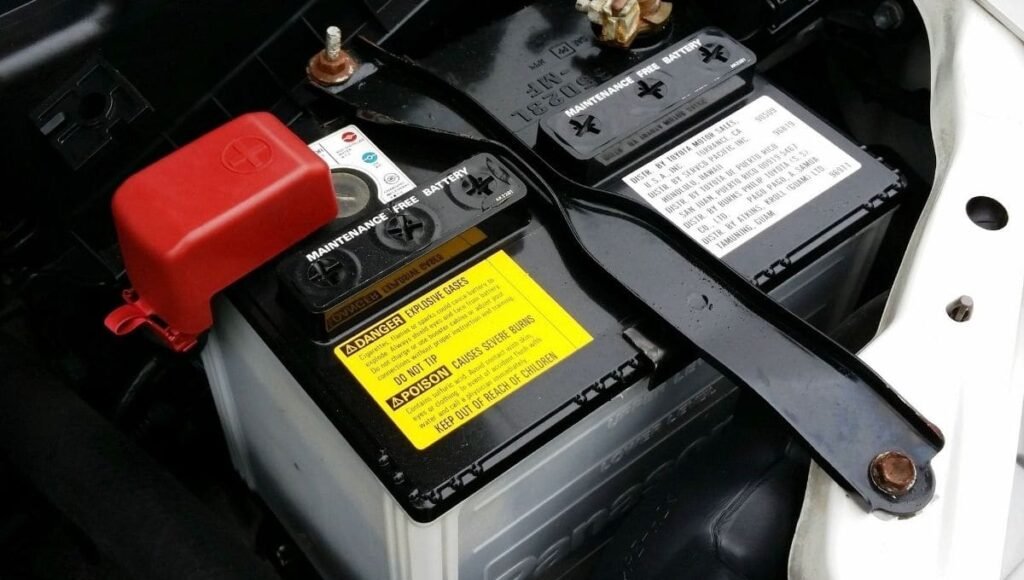
The Role of a Car Battery in Your Vehicle’s System:
The car battery is the heartbeat of your vehicle’s electrical system. It provides the initial surge of electricity needed to start the engine and powers accessories like lights, radio, and dashboard displays.
Without it, your vehicle is essentially lifeless, and its proper functioning is crucial to ensure that all these systems remain operational.
What Happens to the Battery When It’s Left Unused:
When a battery sits unused, it gradually loses charge through a process known as self-discharge.
This is a natural occurrence for all batteries, but the rate of discharge can be accelerated by various factors, such as temperature, humidity, and the overall condition of the battery itself.
The Effects of Inactivity on Battery Charge and Lifespan:
Extended periods of inactivity can shorten a battery’s lifespan significantly. Over time, the chemicals inside the battery degrade, and the lead plates inside the battery may corrode or sulfate, leading to diminished capacity and, ultimately, failure. Keeping a battery idle for too long can render it unreliable or completely unusable.
read also: Can a bad battery cause acceleration issues – Here’s How!
The Impact of Garage Conditions on Battery Health:
Understanding How Garage Environments Affect Batteries:
Garages are not all created equal. The environmental conditions inside can have a profound impact on the health of your car battery.
While they might seem like a protective cocoon for your vehicle, garages can actually expose your battery to fluctuating temperatures, moisture, and other potentially damaging elements.
Temperature Swings: What Extreme Heat and Cold Do to a Car Battery
Batteries are particularly sensitive to extreme temperatures. Excessive heat accelerates the evaporation of the battery’s internal fluids, while cold temperatures can slow down chemical reactions, reducing the battery’s efficiency.
Drastic temperature swings in a garage can exacerbate these effects, shortening the battery’s life and diminishing its performance.
Moisture in the Garage: How Humidity Can Lead to Battery Corrosion
Humidity is another silent enemy of your car battery. High moisture levels can lead to corrosion on the battery terminals, which in turn creates resistance in the electrical connections.
This can make it harder for the battery to supply power to the vehicle when needed and may even prevent it from starting at all.
Optimal Storage Conditions: Safeguarding Your Car Battery:
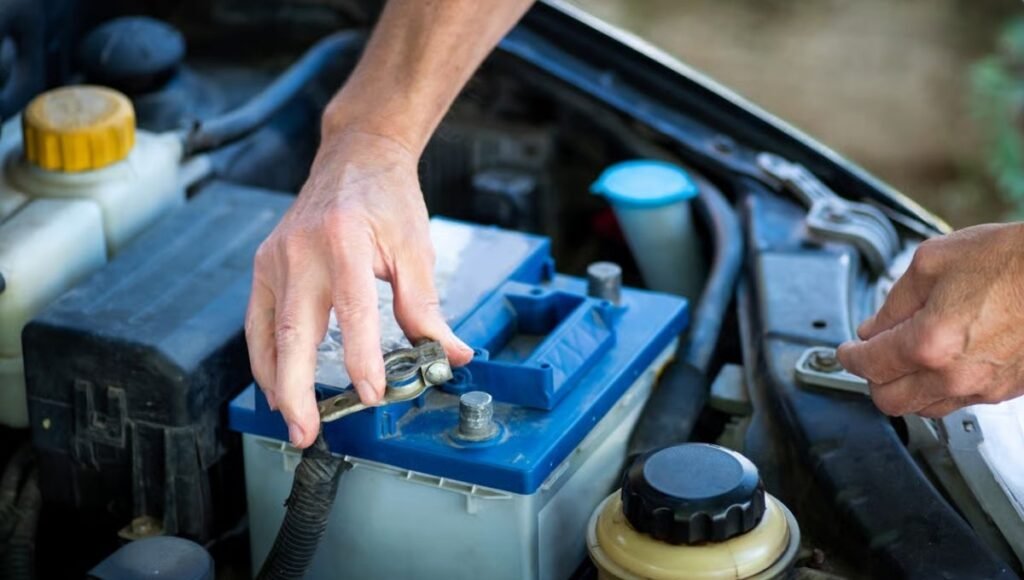
The Ideal Environment for Long-Term Battery Storage:
To ensure that your battery remains in optimal condition during storage, it should be kept in a cool, dry place, away from direct sunlight and extreme temperatures.
Maintaining a stable environment is key. Aim for temperatures between 40°F and 60°F (4°C to 15°C) to minimize chemical degradation and self-discharge.
Should You Disconnect the Battery While It’s in Storage?
Disconnecting the battery can help prevent it from slowly discharging due to small parasitic loads from the vehicle’s electronics.
This is especially important for long-term storage. By disconnecting the negative terminal, you effectively isolate the battery, which can help retain its charge longer.
The Role of Battery Tenders and Trickle Chargers for Maintenance:
Battery tenders and trickle chargers are invaluable tools for maintaining a battery’s charge during extended periods of storage.
These devices provide a small, steady current to the battery, preventing it from draining completely and ensuring that it’s ready for use when needed.
Tips for Maintaining Battery Charge During Extended Garage Stays:
In addition to using a trickle charger, it’s wise to periodically check the battery’s charge with a voltmeter.
Ensuring that the battery doesn’t fall below a critical voltage (typically 12.4V for most lead-acid batteries) is crucial for maintaining its health. Regular checks and minor charging adjustments can make all the difference.
read also: How Long Can I Leave My Car in Accessory Mode – What You Need to Know!
Potential Risks of Leaving a Car Battery in the Garage:
How Long Can a Car Battery Last in Storage Without Damage?
While it varies based on the battery’s condition and the storage environment, most car batteries can last between two to four months in storage without significant damage.
Beyond this timeframe, the risk of deep discharge increases, which can permanently harm the battery’s capacity.
What Causes a Battery to Drain in Storage?
Even when disconnected, small amounts of energy may still dissipate from the battery through a process called self-discharge.
Factors like temperature extremes, the age of the battery, and residual current draw from the vehicle can all contribute to battery drain during storage.
Identifying Physical Signs of a Deteriorating Battery:
Over time, you may notice bulging or bloating of the battery casing, excessive corrosion around the terminals, or even fluid leakage. These are signs that the battery has begun to deteriorate and may need to be replaced to avoid potential failure.
Common Myths About Battery Storage That Could Lead to Damage:
One common myth is that placing a battery on a concrete floor will cause it to discharge faster. While this was true for older battery designs, modern batteries are insulated and can be safely stored on any surface without significant impact on their charge retention.
Preventative Measures for Safe Battery Storage:
How to Prepare Your Battery for Extended Garage Storage:
Before storing your battery, ensure it’s fully charged and clean the terminals of any corrosion. Apply a thin layer of petroleum jelly to the terminals to prevent further corrosion. If possible, store the battery off the ground and in an insulated location.
Best Practices for Insulating and Protecting Your Battery:
Insulating your battery can help mitigate the effects of temperature swings. Battery wraps or specialized insulation blankets are available and can help maintain a stable temperature around the battery, especially in garages that experience significant changes in climate.
The Importance of Regular Checks and Maintenance:
Even when in storage, a battery requires periodic attention. Check the battery every four to six weeks to ensure it’s holding charge and to clean any new corrosion. These simple tasks can dramatically extend the battery’s lifespan.
Using Storage Boxes and Specialized Covers for Extra Protection:
Storage boxes designed for batteries provide an extra layer of protection from dust, moisture, and accidental damage. These boxes are especially useful for long-term storage and can ensure that the battery remains clean and uncontaminated during its dormancy.
When to Consider Alternative Storage Options:
Is Your Garage the Best Place to Store Your Battery?
While garages can be suitable for battery storage, they are not always ideal, especially if they are prone to extreme temperatures or high humidity. Assess your garage conditions carefully before deciding to store your battery there.
Comparing Garage Storage to Other Options: Indoors vs. Outdoors
Indoor storage in a temperature-controlled environment, such as a basement or utility room, is generally preferable to a garage. Outdoors, however, is typically a last resort due to exposure to the elements, which can accelerate battery degradation.
Climate-Controlled Environments: When They’re Worth the Investment
For high-end vehicles or specialized batteries, climate-controlled storage can be a worthwhile investment. This type of environment maintains a stable temperature and humidity level, which is perfect for preserving a battery’s condition over long periods.
Troubleshooting Issues After Garage Storage:
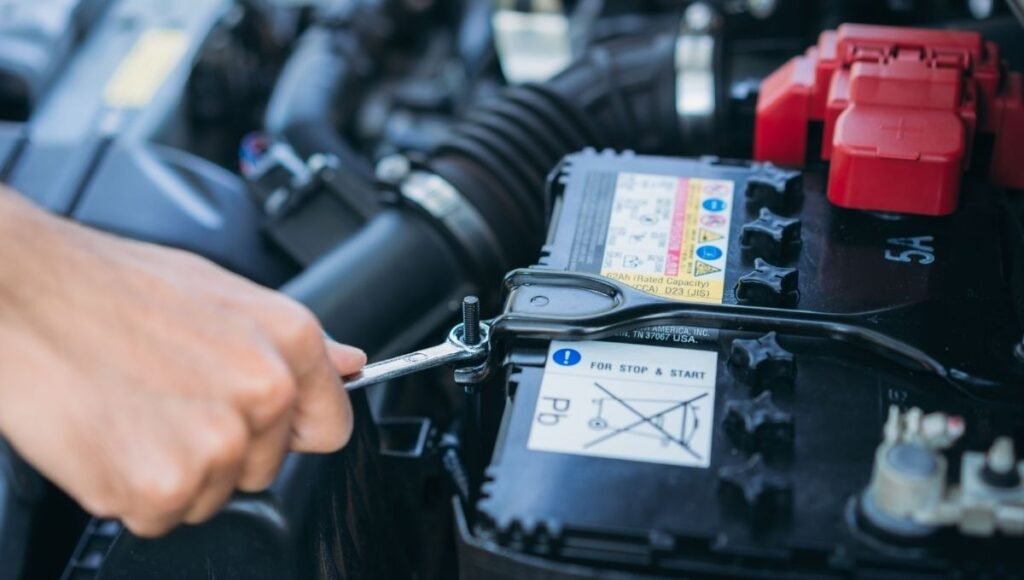
What to Do If Your Battery Won’t Start After Being Stored:
If your battery doesn’t start after storage, the first step is to test the voltage. A reading below 12.4V usually indicates a need for recharging. If recharging doesn’t revive the battery, it may be too far gone and require replacement.
How to Assess and Test the Condition of Your Battery:
Using a multimeter, check the battery’s voltage. A healthy battery should read between 12.4V and 12.6V when fully charged. If it’s lower, consider charging it. If the battery continues to lose charge quickly, it may be suffering from internal degradation.
When to Charge, When to Replace: Making the Right Call
If your battery holds a charge after being recharged, it can likely continue to serve. However, if it repeatedly fails to hold a charge or shows signs of physical damage, replacement is the best option to avoid unexpected failures.
read also: How to Fix Transmission Malfunction After a Dead Battery – Step-by-Step Guide!
FAQ’s
1. Is it OK to leave a car battery in the garage?
Yes, but it depends on the garage conditions. Extreme temperatures and high humidity can damage the battery. It’s best to store it in a cool, dry place and monitor its condition regularly.
2. How long can a car battery last in storage without damage?
Typically, a car battery can last between two to four months in storage. Beyond this period, the risk of deep discharge increases, which may affect the battery’s capacity.
3. What causes a car battery to drain in storage?
Self-discharge is the primary cause of battery drain. Factors like extreme temperatures, battery age, and residual current draw from the vehicle can also contribute to the battery’s depletion.
4. Should I disconnect the battery when storing it in the garage?
Yes, disconnecting the battery helps prevent it from slowly discharging due to small parasitic loads from the vehicle’s electronics, which can help retain its charge longer.
5. What are the signs of a deteriorating battery after storage?
Look for signs such as bulging or bloating of the battery casing, excessive corrosion around the terminals, or fluid leakage. These indicate the battery may be deteriorating and might need replacement.
Conclusion:
Storing a car battery in a garage is possible but requires thoughtful preparation and ongoing maintenance. The health of a battery is influenced by its environment, and ensuring the right conditions will prolong its life and performance. By following best practices for storage, monitoring, and care, you can safeguard your car battery and ensure it’s ready when you need it most.
Read Also:
Does Plugging in a Diesel Charge the Battery – What About the Battery!
Can a Bad Battery Cause No Bus Code – Discover the Answer!
Does auto headlights drain battery – How to Stop It!
Can a bad RV converter drain the battery – Check the Converter!
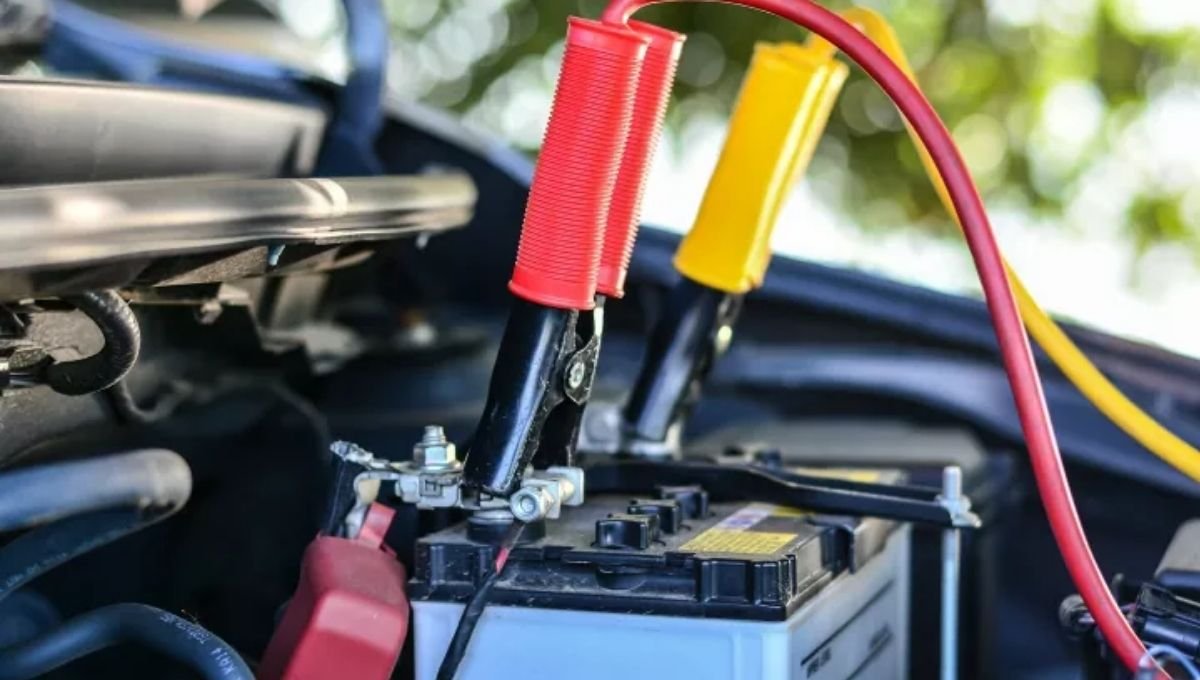

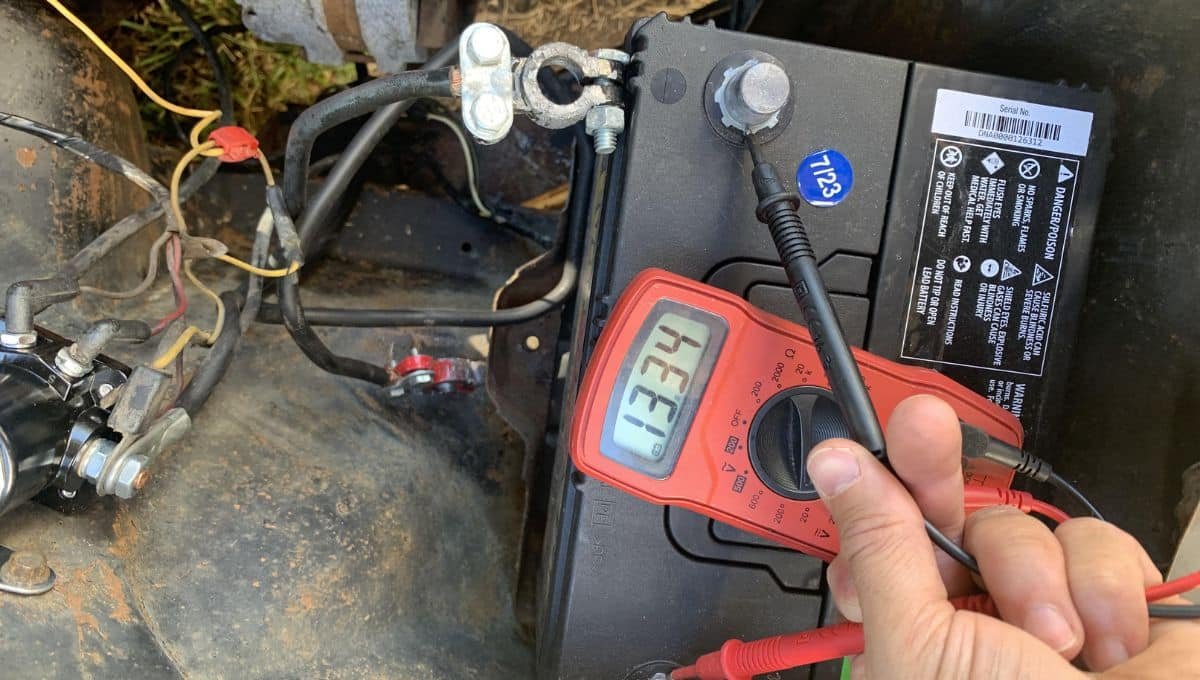











Post Comment